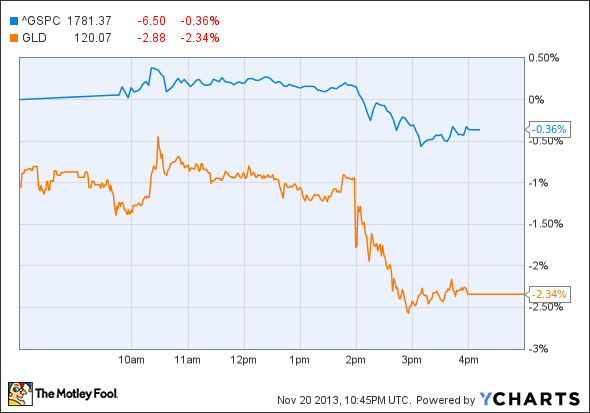Although we don't believe in timing the market or panicking over daily movements, we do like to keep an eye on market changes -- just in case they're material to our investing thesis.
"U.S. stocks hit by Fed taper talk; S&P's loss streak longest in 8 weeks" -- so ran the headline on CNBC.com this afternoon. Is eight weeks really significant? After all, the current losing streak is just three days long, with the S&P 500 falling 0.4% today (the narrower, price-weighted Dow Jones Industrial Average (^DJI 0.40%) also lost 0.4%).
Still, something significant may have occurred today, with the publication of the minutes of the October policy meeting of the Federal Open Market Committee, the group within the Federal Reserve that sets monetary policy. The causal link between the content of those minutes and today's stock market losses is pretty obvious: the S&P 500 had been in the black up until 2 p.m. ET, the time at which the minutes were released.
Admittedly, the magnitude of today's decline does not indicate a huge upset, but note that the reaction in the gold market was more pronounced – the SPDR Gold Shares (GLD 0.32%) finished the day down 2.3%:
Last Saturday, I wrote:
I think it's unlikely that the Fed will decide to scale back its bond purchases in December, but it may be more likely than the market now believes. ... [T]he market's excessively dovish attitude translates into an expected "taper" start date that has been pushed well into next year. I'm not sure why so many analysts appear to be looking out to the summer of 2014 and beyond.
I now think today's stock market reaction may be the start of a recalibration by the market of those expectations -- toward a more hawkish view. Traders had interpreted Janet Yellen's testimony in front of the Senate Banking Committee last week as indicating that quantitative easing would continue until kingdom come and that, therefore, one could be comfortably long the stock market through the end of the year.
The truth of the matter is that Yellen would not be drawn out on any calendar for beginning to reduce the Fed's asset purchases during her question-and-answer session, stressing only that the program is "data-dependent" (i.e., it depends on the evolution of incoming economic data) and "not on a set course."
Furthermore, today's minutes suggest that the Fed is shifting its emphasis from quantitative easing toward "forward guidance" – communicating the likely path of the federal funds rate to the market. That dovetails with comments Ben Bernanke is delivering at a National Economists' Club dinner this evening.
For long-term investors, all of this Fed-related rigmarole is a bit of a distraction, but it's worth keeping in mind that, with traders no longer feeling as secure with regard to the longevity of the QE easy-money gusher, one cannot rule out a correction in a market that has had a remarkable run so far this year.






